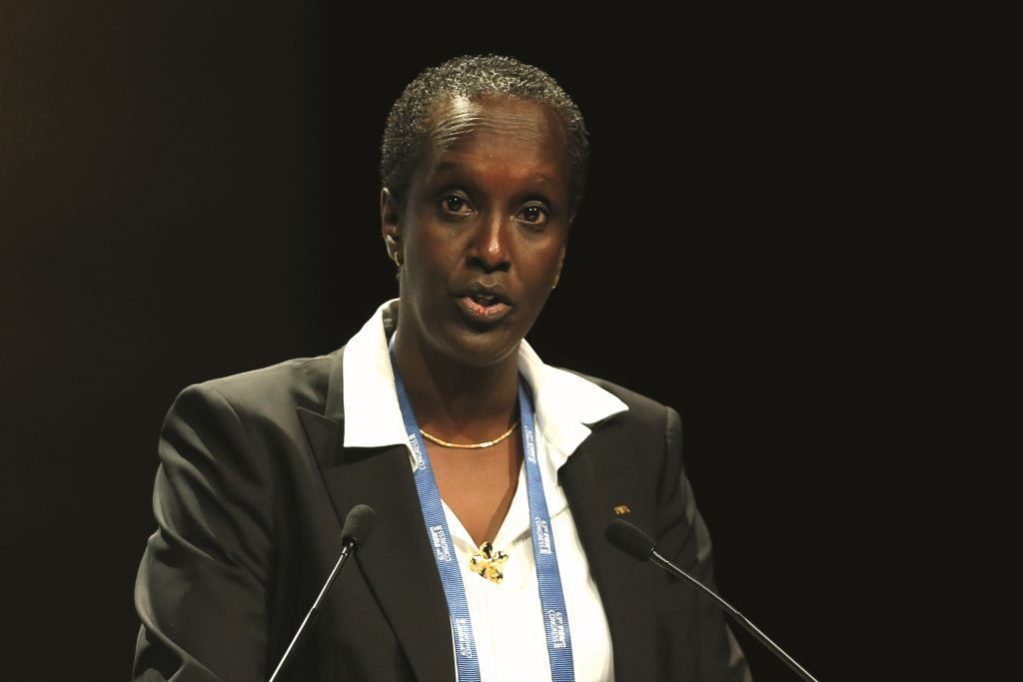Lydia Nsekera was widowed when she was 36 years old. As a member of Burundian aristo-cracy, she could have turned to her family for financial support, but she chose not to. Instead, Nsekera took over her husband’s car repair company and used her skills as an internal auditor to turn it into a successful business.
At the same time, the Burundian Football Federation (FFB) was drowning in debt. The association had suffered severe financial mismanagement, was sanctioned by FIFA and faced an uncertain future. It only took the FFB a few months to see the improvements Nsekera had made at her garage before it approached her for assistance.
At face value it was an odd match. Nsekera was not a soccer player. She spent her school days playing basketball and competing in high jump, but had become interested in the game though her father and kept an eye on it over the years. Nsekera was savvy, and the FFB decided it could use someone with her acumen to lift it out of crisis.
When she was asked to accept a nomination for president of the federation, Nsekera was hesitant. She did not doubt her own ability but was unsure if she would be given the free rein she needed to turn around the ailing organization. She agreed to stand, provided she would be allowed to overhaul the structures if she was elected. The FFB agreed and Nsekera won the vote ahead of two male candidates.
A decade later, she became the first – and only – woman to sit on FIFA’s decision-making executive committee in its 109-year history, establishing herself as the pioneer for women’s representation in a man’s world.
“It’s massive for women and I hope our federation and other federations can follow the same path,” says Fran Hilton-Smith, the technical director of the South African Football Association (Safa).
“For example, in South Africa, we only have two women on the national executive committee and one of them is seconded from the PSL. It’s just the reality that football is still male-dominated, but like [Nsekera] has shown, to be successful as a woman, you need to be very determined.”
Hilton-Smith calls it “a miracle”, as it was previously unheard of for a woman to occupy such a senior position in a country’s soccer association. Of FIFA’s 209 member associations, Burundi’s is the only one to have a woman at its helm.
“For her to have been given that position was unprecedented,” says Hilton-Smith.
In her first year at the FFB, Nsekera achieved two major feats. She revived the national league, which had been dormant for three seasons, and rekindled the organization’s relationship with FIFA – to the extent that the soccer governing body agreed to pay for a new office complex for the FFB.
During Nsekera’s tenure, the Burundian league grew to three divisions, FIFA has funded another development project in the country and approved a plan for a national training center in the capital, Bujumbura. The country also held its first women’s soccer championship and the under-17 team won the East African regional competition.
The fortunes of Burundi’s national team have not changed as dramatically. They narrowly missed out on qualifying for the 2008 Africa Nations Cup, but rose from 147th to 104th in the rankings. Now they lie at 124th.
Officials at the FFB do not blame Nsekera for the team’s middling fortunes; instead they have praised her for what she has achieved so far.
“She will go as far as she wants, thanks to her work ethic and authority,” says Jeremie Manirakiza, the executive secretary of the FFB.
By her own admission, Nsekera’s success has come through slog. She has told Associated Press her recipe is simple. “I work, I work and I work.”
With that as her mantra, Nsekera has sat on the executive council of both the East and Central African Football associations, and was part of FIFA’s independent governance commission, as well as its radio and television sub-committee. Her role in furthering the cause of women has extended to serving on the African Women’s Football Commission, the Women’s World Cup Commission and the International Olympic Committee’s Women and Sport Commission.
Promoting the women’s agenda will be one of her focal points on the FIFA executive committee, but it cannot be her only one. The 25-person executive committee makes all the rulings that govern the world game. Members meet at least twice a year and among their most important considerations are the dates and places of FIFA tournaments, not to mention the regulations around how the world body is run.
Given Nsekera’s experience in overhauling an organization, her opinions should carry weight.
“She is on the committee and she will definitely be respected,” Hilton-Smith predicts.
Already, Nsekera has faced naysayers, ironically, other women. A FIFA delegate argues Australia’s Maya Dodd, a former international player and lawyer by trade, who was running against Nsekera, would have been a better choice and that Nsekera was pushed through only because there was much “pandering to the African vote.”
The same members claim Nsekera is not strong enough to take on the job because, “all she ever said at a meeting was: ‘Thank you for taking women’s football seriously’, and that she was only on the executive because Sepp Blatter had handpicked her for the job.
The FIFA boss, who has long supported Nsekera, has described her as a “princess of the game”. Whether or not that is because he wants the backing of the African continent in the future is debatable, but what is certain is that even if Nsekera was given an opportunity driven by someone else’s agenda, she is not one to waste a chance. Just ask the FFB.
